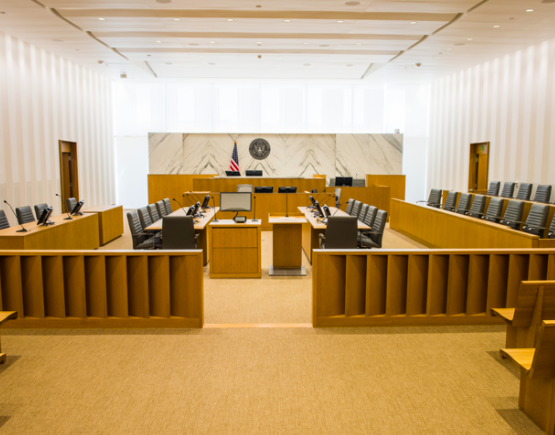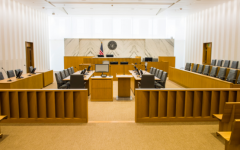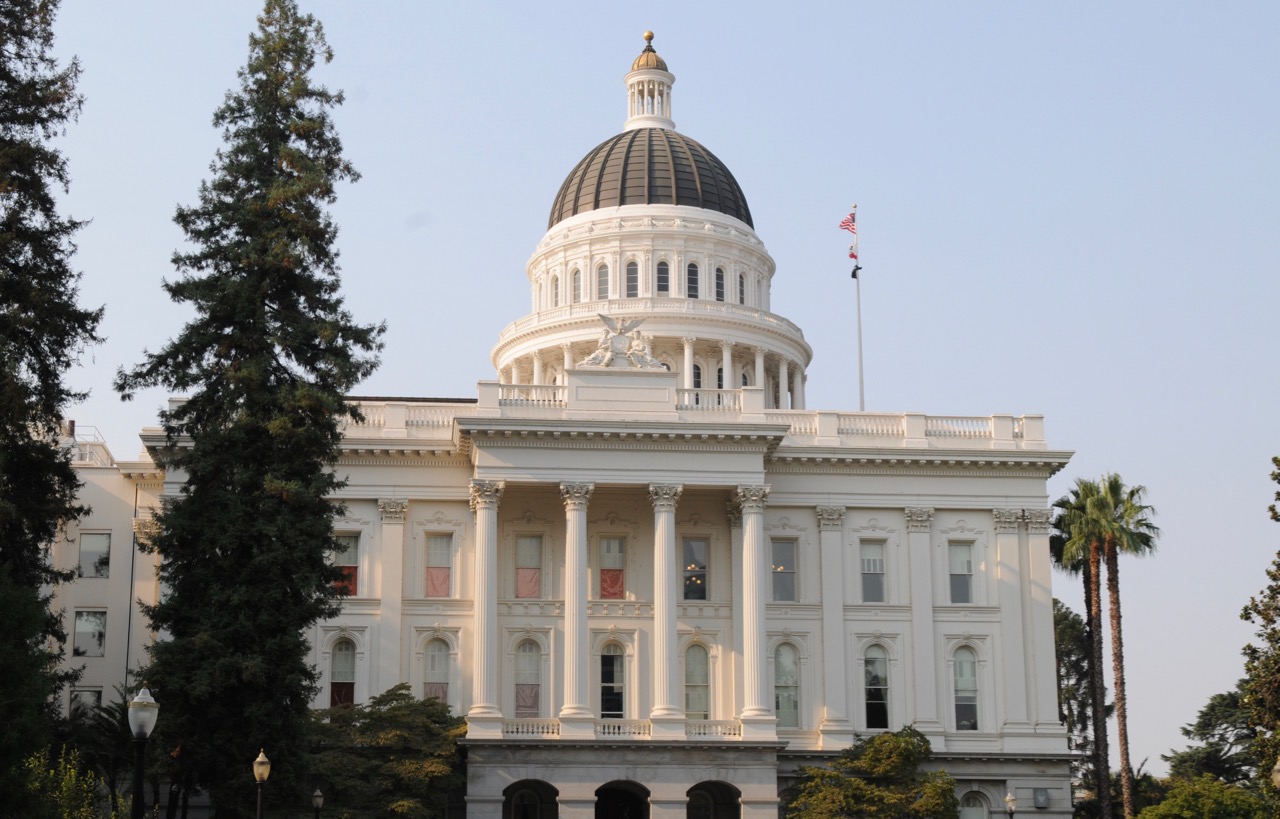
Central District of California in Los Angeles courtroom. (Photo: uscourts.gov)
Evidence from Extrinsic Policies in California Courts
Evidence Affected or Excluded by Extrinsic Policies
By Chris Micheli, August 4, 2024 2:30 am
The California Evidence Code in Division 9 deals with Evidence Affected or Excluded by Extrinsic Policies. Chapter 1 concerns Evidence of Character, Habit, or Custom. Section 1100 states that any otherwise admissible evidence (including evidence in the form of an opinion, evidence of reputation, and evidence of specific instances of such person’s conduct) is admissible to prove a person’s character or a trait of his character.
Under Section 1101, as a general rule, evidence of a person’s character or a trait of his or her character (whether in the form of an opinion, evidence of reputation, or evidence of specific instances of his or her conduct) is inadmissible when offered to prove his or her conduct on a specified occasion.
In addition, there is no prohibition against the admission of evidence that a person committed a crime, civil wrong, or other act when relevant to prove some fact (such as motive, opportunity, intent, preparation, plan, knowledge, identity, absence of mistake or accident, or whether a defendant in a prosecution for an unlawful sexual act or attempted unlawful sexual act did not reasonably and in good faith believe that the victim consented) other than his or her disposition to commit such an act.
Section 1102 specifies that, in a criminal action, evidence of the defendant’s character or a trait of his character in the form of an opinion or evidence of his reputation is not made inadmissible if such evidence is (a) offered by the defendant to prove his conduct in conformity with such character or trait of character, and (b) offered by the prosecution to rebut evidence adduced by the defendant.
Section 1103 provides that, in a criminal action, evidence of the character or a trait of character (in the form of an opinion, evidence of reputation, or evidence of specific instances of conduct) of the victim of the crime for which the defendant is being prosecuted is not made inadmissible if the evidence is (1) offered by the defendant to prove conduct of the victim in conformity with the character or trait of character, and (2) offered by the prosecution to rebut evidence adduced by the defendant.
In addition, in a criminal action, evidence of the defendant’s character for violence or trait of character for violence (in the form of an opinion, evidence of reputation, or evidence of specific instances of conduct) is not made inadmissible if the evidence is offered by the prosecution to prove conduct of the defendant in conformity with the character or trait of character and is offered after evidence that the victim had a character for violence or a trait of character tending to show violence has been adduced by the defendant.
Section 1104 states that, with specified exceptions, evidence of a trait of a person’s character with respect to care or skill is inadmissible to prove the quality of his conduct on a specified occasion.
Section 1105 provides that any otherwise admissible evidence of habit or custom is admissible to prove conduct on a specified occasion in conformity with the habit or custom.
Section 1106 states that, in any civil action alleging conduct which constitutes sexual harassment, sexual assault, or sexual battery, opinion evidence, reputation evidence, and evidence of specific instances of the plaintiff’s sexual conduct, or any of that evidence, is not admissible by the defendant in order to prove consent by the plaintiff or the absence of injury to the plaintiff, unless the injury alleged by the plaintiff is in the nature of loss of consortium. There are exceptions to this provision.
Section 1107 specifies that, in a criminal action, expert testimony is admissible by either the prosecution or the defense regarding intimate partner battering and its effects, including the nature and effect of physical, emotional, or mental abuse on the beliefs, perceptions, or behavior of victims of domestic violence, except when offered against a criminal defendant to prove the occurrence of the act or acts of abuse which form the basis of the criminal charge.
Section 1107.5 provides that, in a criminal action, expert testimony is admissible by either the prosecution or the defense regarding the effects of human trafficking on human trafficking victims, including the nature and effect of physical, emotional, or mental abuse on the beliefs, perceptions, or behavior of human trafficking victims.
Section 1108 provides that, in a criminal action in which the defendant is accused of a sexual offense, evidence of the defendant’s commission of another sexual offense or offenses is not made inadmissible if the evidence is not inadmissible pursuant to Section 352. Several definitions are set forth.
Section 1109 states that, in a criminal action in which the defendant is accused of an offense involving domestic violence, evidence of the defendant’s commission of other domestic violence is not made inadmissible if the evidence is not inadmissible pursuant to Section 352.
Chapter 2 deals with Mediation. Section 1115 defines the terms “mediation,” “mediator,” and “mediation consultation” Section 1116 allows a court to order participation in a dispute resolution proceeding. Nothing in this chapter authorizes or affects the enforceability of a contract clause in which parties agree to the use of mediation.
Section 1117 applies this chapter to a mediation, but does not apply to certain family law proceedings and settlement conferences.
Section 1118 defines an oral agreement that satisfies these conditions:
(a) The oral agreement is recorded by a court reporter or reliable means of audio recording.
(b) The terms of the oral agreement are recited on the record in the presence of the parties and the mediator, and the parties express on the record that they agree to the terms recited.
(c) The parties to the oral agreement expressly state on the record that the agreement is enforceable or binding, or words to that effect.
(d) The recording is reduced to writing and the writing is signed by the parties within 72 hours after it is recorded.
Section 1119 sets forth three provisions:
(a) No evidence of anything said or any admission made for the purpose of, in the course of, or pursuant to, a mediation or a mediation consultation is admissible or subject to discovery, and disclosure of the evidence shall not be compelled, in any arbitration, administrative adjudication, civil action, or other noncriminal proceeding in which, pursuant to law, testimony can be compelled to be given.
(b) No writing that is prepared for the purpose of, in the course of, or pursuant to, a mediation or a mediation consultation, is admissible or subject to discovery, and disclosure of the writing shall not be compelled, in any arbitration, administrative adjudication, civil action, or other noncriminal proceeding in which, pursuant to law, testimony can be compelled to be given.
(c) All communications, negotiations, or settlement discussions by and between participants in the course of a mediation or a mediation consultation shall remain confidential.
Section 1120 provides that evidence otherwise admissible or subject to discovery outside of a mediation or a mediation consultation is not inadmissible or protected from disclosure solely by reason of its introduction or use in a mediation or a mediation consultation. There are several exceptions provided in this section.
Section 1121 states that a mediator or any other person cannot submit to a court or other adjudicative body, and a court or other adjudicative body may not consider, any report, assessment, evaluation, recommendation, or finding of any kind by the mediator concerning a mediation conducted by the mediator, other than a report that is mandated by court rule or other law and that states only whether an agreement was reached, unless all parties to the mediation expressly agree otherwise in writing, or orally.
Section 1122 specifies that a communication or a writing that is made or prepared for the purpose of, or in the course of, or pursuant to, a mediation or a mediation consultation, is not made inadmissible, or protected from disclosure, by provisions of this chapter any of the specified conditions are satisfied.
Section 1123 states that a written settlement agreement prepared in the course of, or pursuant to, a mediation, is not made inadmissible, or protected from disclosure, by provisions of this chapter if the agreement is signed by the settling parties and any of the specified conditions are satisfied.
Section 1124 provides that an oral agreement made in the course of, or pursuant to, a mediation is not made inadmissible, or protected from disclosure, by the provisions of this chapter if any of the specified conditions are satisfied.
Section 1125 states that, for purposes of confidentiality under this chapter, a mediation ends when one of the two specified conditions is satisfied.
Section 1126 provides that anything said, any admission made, or any writing that is inadmissible, protected from disclosure, and confidential under this chapter before a mediation ends, remains inadmissible, protected from disclosure, and confidential to the same extent after the mediation ends.
Section 1127 states that, if a person subpoenas or otherwise seeks to compel a mediator to testify or produce a writing, and the court or other adjudicative body determines that the testimony or writing is inadmissible under this chapter, or protected from disclosure under this chapter, the court or adjudicative body making the determination will award reasonable attorney’s fees and costs to the mediator against the person seeking the testimony or writing.
Section 1128 specifies that any reference to a mediation during any subsequent trial is an irregularity in the proceedings of the trial, and any reference to a mediation during any other subsequent noncriminal proceeding is grounds for vacating or modifying the decision in that proceeding, in whole or in part, and granting a new or further hearing on all or part of the issues, if the reference materially affected the substantial rights of the party requesting relief.
Section 1129 requires an attorney representing a client participating in a mediation or a mediation consultation to, as soon as reasonably possible before the client agrees to participate in the mediation or mediation consultation, provide that client with a printed disclosure containing the confidentiality restrictions under current law and obtain a printed acknowledgment signed by that client stating that he or she has read and understands the confidentiality restrictions.
Chapter 3 concerns other evidence that is affected or excluded by extrinsic policies. Section 1150 provides that, upon an inquiry as to the validity of a verdict, any otherwise admissible evidence may be received as to statements made, or conduct, conditions, or events occurring, either within or without the jury room, of such a character as is likely to have influenced the verdict improperly.
Section 1151 provides that, when, after the occurrence of an event, remedial or precautionary measures are taken, which, if taken previously, would have tended to make the event less likely to occur, evidence of those subsequent measures is inadmissible to prove negligence or culpable conduct in connection with the event.
Section 1152 states that evidence that a person has, in compromise or from humanitarian motives, furnished or offered or promised to furnish money or any other thing, act, or service to another who has sustained or will sustain or claims that he or she has sustained or will sustain loss or damage, as well as any conduct or statements made in negotiation thereof, is inadmissible to prove his or her liability for the loss or damage or any part of it. There are specified exceptions that do not affect the admissibility of certain evidence.
Section 1153 states that evidence of a plea of guilty, later withdrawn, or of an offer to plead guilty to the crime charged or to any other crime, made by the defendant in a criminal action is inadmissible in any action or in any proceeding of any nature, including proceedings before agencies, commissions, boards, and tribunals.
Section 1153.5 provides that evidence of an offer for civil resolution of a criminal matter, or admissions made in the course of or negotiations for the offer, is not admissible in any action.
Section 1154 states that evidence that a person has accepted or offered or promised to accept a sum of money or any other thing, act, or service in satisfaction of a claim, as well as any conduct or statements made in negotiation thereof, is inadmissible to prove the invalidity of the claim or any part of it.
Section 1155 specifies that evidence that a person was, at the time a harm was suffered by another, insured wholly or partially against loss arising from liability for that harm is inadmissible to prove negligence or other wrongdoing.
Section 1156 states that, in-hospital medical staff committees of a licensed hospital may engage in research and medical or dental study for the purpose of reducing morbidity or mortality, and may make findings and recommendations relating to such purpose.
Section 1156.1 provides that a committee may engage in research and medical or psychiatric study for the purpose of reducing morbidity or mortality, and may make findings and recommendations to the county and state relating to such purpose.
Section 1156.5 says that evidence that a person suffered or experienced excited delirium cannot be admitted in any civil action. A party or witness may describe the factual circumstances surrounding the case, including a person’s demeanor, conduct, and physical and mental condition at issue, including, but not limited to, a person’s state of agitation, excitability, paranoia, extreme aggression, physical violence, and apparent immunity to pain, but cannot describe or diagnose such demeanor, conduct, or condition by use of the term excited delirium, or attribute such demeanor, conduct, or physical and mental condition to that term.
Section 1157.5 provides that, with exceptions, the prohibition relating to discovery or testimony in certain instances is also applicable to the proceedings or records of an organized committee of any nonprofit medical care foundation or professional standards review organization which is organized in a manner which makes available professional competence to review health care services with respect to medical necessity, quality of care, or economic justification of charges or level of care.
Section 1157.6 states that neither the proceedings nor the records of a committee having the responsibility of evaluation and improvement of the quality of mental health care rendered in county operated and contracted mental health facilities is subject to discovery.
Section 1157.7 says that certain prohibitions relating discovery or testimony are applicable to proceedings and records of any committee established by a local governmental agency to monitor, evaluate, and report on the necessity, quality, and level of specialty health services.
Section 1158 defines the term “medical provider.” Before the filing of any action or the appearance of a defendant in an action, if an attorney at law or his or her representative presents a written authorization therefor signed by an adult patient, by the guardian or conservator of his or her person or estate, or, in the case of a minor, by a parent or guardian of the minor, or by the personal representative or an heir of a deceased patient, or a copy thereof, to a medical provider, the medical provider is required to promptly make all of the patient’s records under the medical provider’s custody or control available for inspection and copying by the attorney at law or his or her representative.
Sectio 1159 specifies that no evidence pertaining to live animal experimentation, including, but not limited to, injury, impact, or crash experimentation, is admissible in any product liability action involving a motor vehicle or vehicles.
Section 1160 states that the portion of statements, writings, or benevolent gestures expressing sympathy or a general sense of benevolence relating to the pain, suffering, or death of a person involved in an accident and made to that person or to the family of that person are inadmissible as evidence of an admission of liability in a civil action. A statement of fault, however, which is part of, or in addition to, any of the above can be admissible.
Section 1161 provides that evidence that a victim of human trafficking has engaged in any commercial sexual act as a result of being a victim of human trafficking is inadmissible to prove the victim’s criminal liability for the commercial sexual act. In addition, evidence of sexual history or history of any commercial sexual act of a victim of human trafficking is inadmissible to attack the credibility or impeach the character of the victim in any civil or criminal proceeding.
Section 1162 states that evidence that a victim of, or a witness to, a serious felony as an assault, domestic violence, extortion, human trafficking, sexual battery, or stalking has engaged in an act of prostitution at or around the time they were the victim of or witness to the crime is inadmissible in a separate prosecution of that victim or witness to prove criminal liability for the act of prostitution.
- Cullen Earthquake Act - February 17, 2026
- Encumbrances in Eminent Domain - February 17, 2026
- Trial for Partition of Property in California - February 16, 2026




